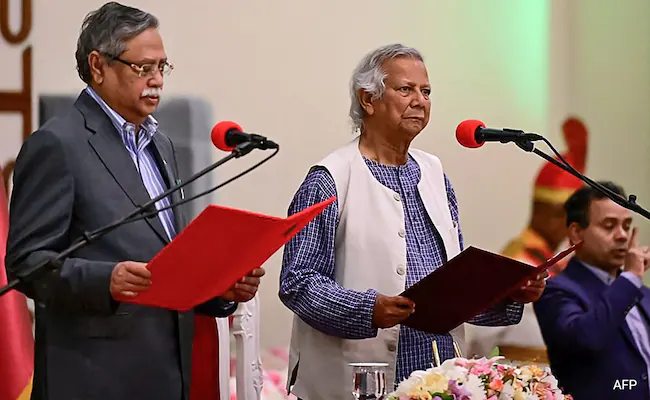August 9, 2024: Marking the start of a new era in Bangladesh’s political landscape, Nobel Peace Prize winner Muhammad Yunus was sworn in as the head of the interim government on Thursday. This comes after Sheikh Hasina, the long-serving prime minister, stepped down following widespread protests and fled the country.
“I will uphold, support, and protect the constitution and will perform my duties sincerely,” Mr. Yunus, 84, stated during the swearing-in ceremony held at the Bangabhaban, the official residence of President Mohammed Shahabuddin. The ceremony follows Mr. Yunus’ return to Dhaka from Paris, where he had been receiving medical treatment.
The transition occurs amid a tumultuous time for Bangladesh, which has been plagued by violence and unrest even after Sheikh Hasina resigned and fled to India on Monday. The protests, primarily led by students, intensified after the January 7 elections, which saw Sheikh Hasina’s Awami League win by a landslide. However, the elections were widely criticized for being neither free nor fair.
Muhammad Yunus, who was awarded the Nobel Peace Prize in 2006 for his work in pioneering microcredit and microfinance through Grameen Bank, now leads a 16-member advisory council that will assist him in his new role as the chief adviser of the interim government. The council includes key figures like Nahid Islam and Asif Mahmud, leaders of the protests that led to Sheikh Hasina’s ouster, and Adilur Rahman Khan, a prominent rights activist who was jailed during Hasina’s regime.
In his remarks before the ceremony, Mr. Yunus declared, “Today is a glorious day for us… Bangladesh has created a new victory day. Bangladesh has got a second independence.” He urged the nation to restore order, emphasizing that the country could not move forward without addressing the current law and order situation.
Prime Minister Narendra Modi extended his best wishes to Mr. Yunus, expressing hope for a quick return to normalcy in Bangladesh, with assurances of safety for Hindus and other minorities. “We hope for an early return to normalcy, ensuring the safety and protection of Hindus and all other minority communities,” PM Modi wrote on social media platform X.
The protests that led to Sheikh Hasina’s resignation were sparked in June when the Bangladeshi High Court reinstated a controversial 30% reservation in government jobs for family members of freedom fighters and veterans from the 1971 War of Independence. The decision was later scaled back by the Supreme Court, but Hasina’s handling of the protests and her alleged derogatory remarks about the protesters fueled further unrest.
On Monday, massive student-led demonstrations overwhelmed the streets of Dhaka, eventually forcing Sheikh Hasina to step down. Despite her resignation, violence continued in parts of the country, with reports of minorities, including Hindus, being targeted.
As the interim government steps in, all eyes are on how Muhammad Yunus and his council will steer Bangladesh through this period of political transition and instability.




